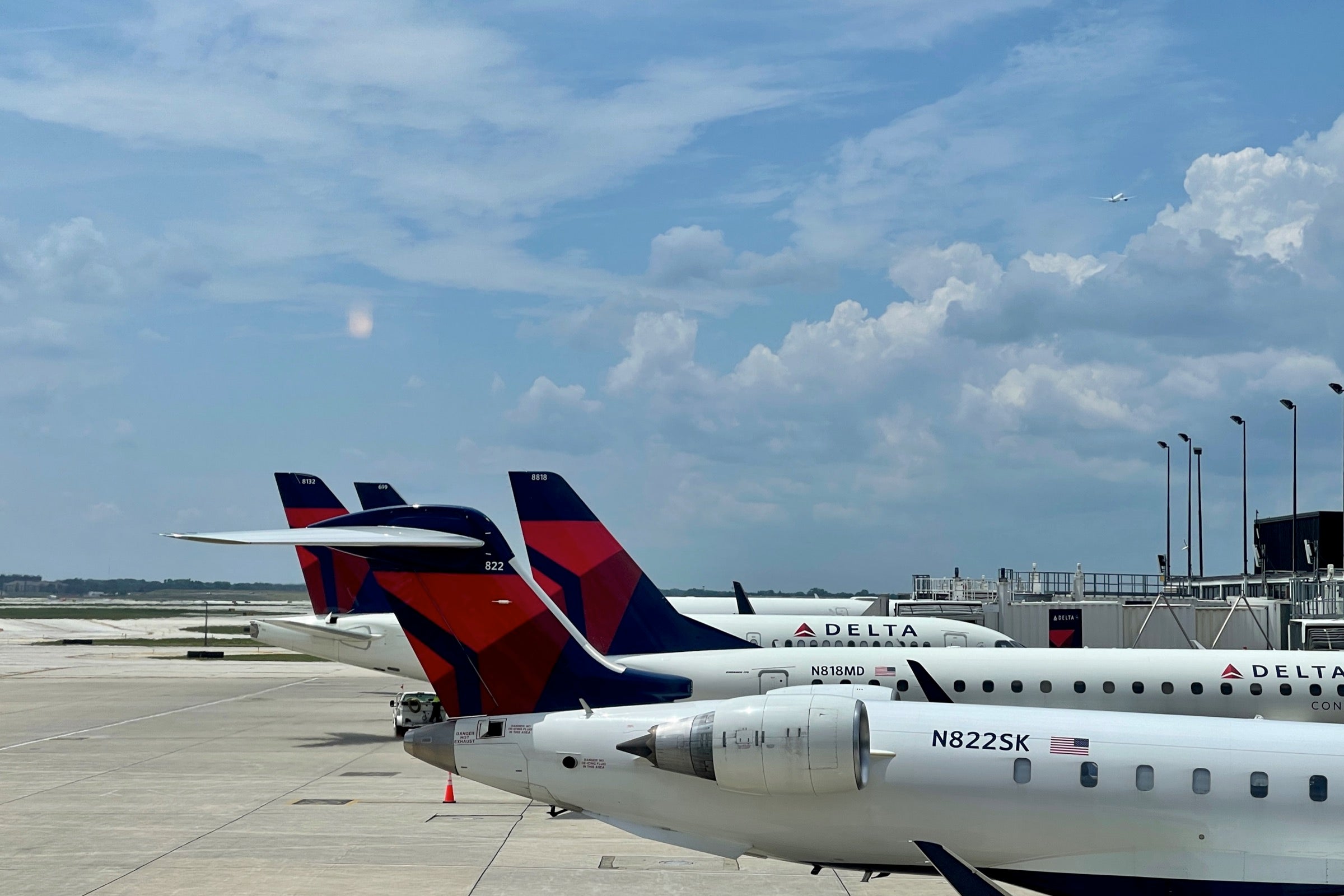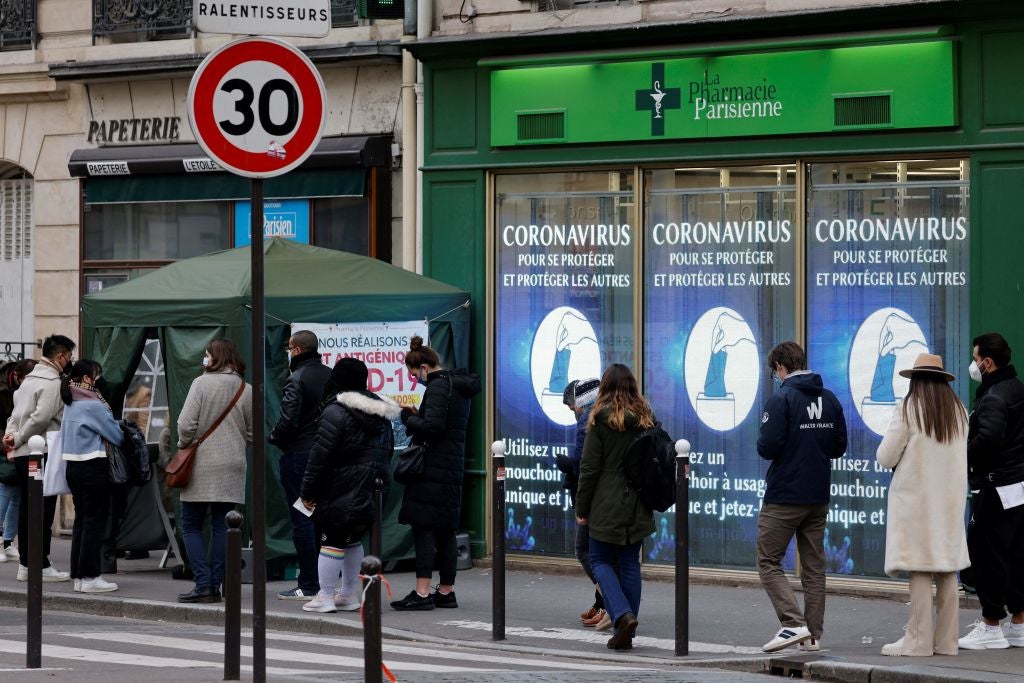HOSTED BY: 1 AIR TRAVEL
Pre-travel testing to the United States likely isn’t going away anytime soon.
When omicron became a variant of concern, the U.S. made it more difficult — not easier — to fly into the country from abroad. Currently, all travelers flying to the U.S. from abroad who are 2 or older, regardless of vaccination status or citizenship, must show results of a negative COVID-19 test taken within one day of departure.
But is it time for the U.S. to reexamine its reentry COVID-19 testing policy? Here’s what health experts and travel analysts say.
For more TPG news delivered each morning to your inbox, sign up for our free daily newsletter.
What the data shows about the pre-travel testing program

(Photo by Andrew Kunesh/The Points Guy)
The U.S. is currently experiencing a COVID-19 surge that surpasses even the beginning of the pandemic in 2020 and the delta variant surge in 2021.
According to data from The New York Times, 1.4 million people reported positive cases on Jan. 10 alone. The number of hospitalizations and deaths in the U.S. has also risen while cases reach record highs worldwide.
The pre-travel testing mandate aims to catch people with positive cases of COVID-19 before they board U.S.-bound aircraft.
What’s problematic about omicron is how highly contagious it is, even if it’s less fatal than the delta variant. Still, a highly contagious variant exploding worldwide isn’t great news for travel, especially as we approach the busy spring break season.
As frustrating as the reentry test requirement may be, some health experts believe the mandate should stay in place, at least for now.
“The testing mandate certainly can weed out COVID-19-positive travelers, and it has provided an added layer of reassurances,” said Dr. Jenny Yu, the head of medical affairs at Healthline Media (which is owned by TPG’s parent company, Red Ventures). “However, with omicron, we are certainly moving into a different phase of this pandemic, and we do need to re-imagine the testing strategy.”
Yu also noted that pre-travel testing reduces the number of people who might burden stressed health care systems without enough resources such as health care staff, personal protective equipment and space if they become seriously ill after a positive test.
But is the program actually catching positive cases? It isn’t easy to answer, as the U.S. doesn’t keep a database of how many travelers test positive before their flight into the country. However, some airlines have conducted their own research, primarily to make the case that it’s still safe to travel.
Delta Air Lines published a study in Mayo Clinic Proceedings suggesting the infection rate on its “COVID-tested flight corridors” between New York-JFK, Atlanta (ATL) and Rome (FCO) stood at 0.05%, or 5 out of every 10,000 passengers. According to the airline, nearly 10,000 potential passengers underwent testing in the U.S., with just four (0.04%) testing positive. The study was conducted from December 2020 to May 2021.
The study, published in September 2021 before the omicron variant emerged, said the risk of being exposed to COVID-19 while traveling after all passengers test negative 72 hours in advance of their trip was less than 0.1%. However, it’s important to note that the Delta study focuses on the risk of exposure and transmission during airline travel, not international travelers who test positive before they leave.
A study by travel management platform TripIt found that just 1% of travelers had to reschedule or change their trip plans due to a positive COVID-19 test. Additionally, 1% of respondents contracted (or traveled with someone who contracted) the virus during a trip.
Even with little concrete data on how many international travelers have been turned away from U.S.-bound flights due to a positive result, there is a case to be made for keeping the mandate in place given the continued spread of the omicron variant.
Still, as Yu pointed out, it could soon be time to “re-imagine the testing strategy.”
And there’s an argument to be made that the testing timeline needs to be revisited, especially with how difficult it can be to get a COVID-19 test right now.
Testing difficulties at home and abroad

(Photo by Ludovic Marin/AFP/Getty Images)
The White House tightened the reentry test requirement in late November after the discovery of the omicron variant, as the previous entry requirements allowed vaccinated travelers to take a test within three days of coming to the U.S.
Unlike some countries, the U.S. is relatively flexible regarding which tests are approved for travel. PCR and rapid antigen tests conducted by a lab are allowed, along with proof of recovery for those who recently recovered from the virus. Additionally, at-home tests like Abbott’s BinaxNow COVID-19 Home Test, which is proctored remotely online, are approved for travel to the U.S.
Such options give travelers more flexibility, but at-home rapid tests (and even in-person tests) have been hard to come by lately due to the omicron variant. And the few tests that are acceptable for travel are subject to markups or delays due to supply constraints.
PCR tests are also proving hard to find. Results at some clinics in New York City, where I live, can take as long as a week.
Omicron is spreading much faster, Yu said, and having to wait days (or weeks, in some cases) for a PCR test result may not be reliable enough to stop the spread — thus leading to more positive cases.
Even with omicron’s spread, moving back to the three-day requirement could ease the burden for travelers who have difficulties tracking down a test while abroad.
Virtuoso, a luxury travel network, told TPG its travel advisors were urging their clients to take proctored test kits with them when they travel so they won’t have trouble meeting the one-day testing requirement. Some advisors will even help their clients secure kits.
Timing your test to meet the new requirements can also be a hassle. The one-day requirement gives travelers significantly less time to arrange for a COVID-19 test before their flight. It can potentially complicate travel plans for those with jam-packed itineraries or people in more remote destinations with less access to testing.
The travel industry hasn’t been particularly outspoken about the international testing mandate — it’s a domestic mandate the industry didn’t want. However, some industry players, such as the International Air Transport Association, the trade association of airlines worldwide, don’t think a testing mandate should apply for vaccinated travelers at all.
“Modeling work from the United Kingdom shows that testing requirements for vaccinated travelers have minimal impact on the spread of COVID-19, particularly once new variants are circulating widely in the community,” Perry Flint, the head of U.S. corporate communications at IATA, told TPG in a statement.
“We believe governments should remove travel barriers (including quarantine and testing) for those fully vaccinated with a WHO-approved vaccine and enable quarantine-free travel for nonvaccinated travelers with a negative predeparture antigen test result,” Flint continued.
Bottom line
The U.S. COVID-19 pre-travel test mandate needs some work — but scrapping the program altogether may not be the answer right now.
There is some data (though admittedly not much) that the U.S. is at least catching some COVID-19-positive travelers before their incoming flights. As long as omicron continues to spread, the U.S. will need to be hypervigilant about catching as many positive cases as possible.
However, the one-day rule is difficult to comply with, especially if you have complicated travel plans, or can’t obtain a valid at-home test before departure. In destinations where the health care system is already strained, obtaining a test and result before your flight to the U.S. might be simply out of the question.
Restoring the three-day window for vaccinated travelers would make it far easier for people to obtain a COVID-19 test (and the results) in time, making travel less burdensome.
But until the testing mandate is reevaluated, travelers are still finding ways to travel abroad and comply with the current rule. For instance, Misty Belles, the vice president of global public relations at Virtuoso, noted that the shortened testing requirement didn’t deter Virtuoso travelers, with 85% saying they were in a “ready-to-travel state of mind.”
“Travelers do have a number of options that make the [one-day rule] less daunting,” Belles said.
Featured photo by Justin Paget/Getty Images.
Title: It’s time to rethink the COVID-19 travel testing mandate in the US
Sourced From: thepointsguy.com/news/us-testing-reentry-policy/
Published Date: Fri, 14 Jan 2022 14:30:19 +0000
No comments:
Post a Comment